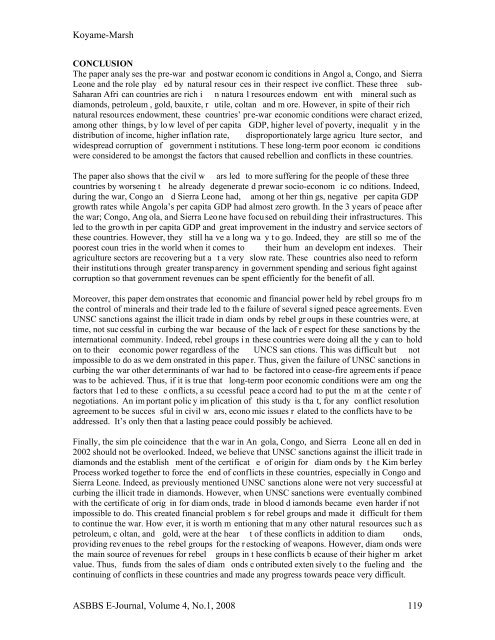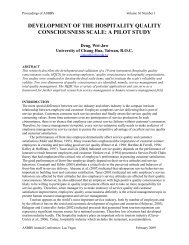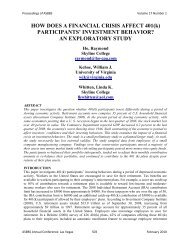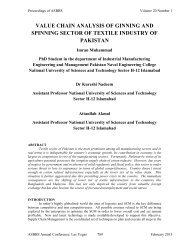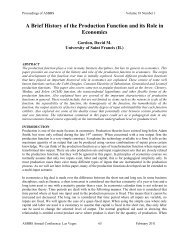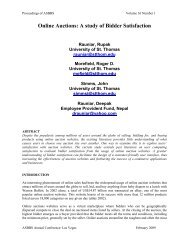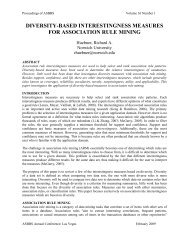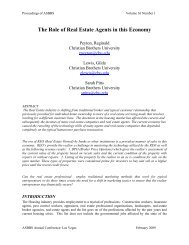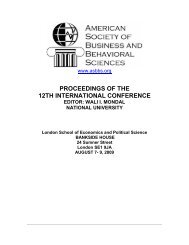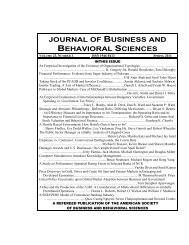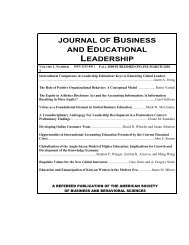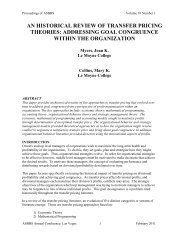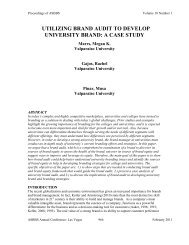stock repurchase announcements: a test of market ... - Asbbs.org
stock repurchase announcements: a test of market ... - Asbbs.org
stock repurchase announcements: a test of market ... - Asbbs.org
You also want an ePaper? Increase the reach of your titles
YUMPU automatically turns print PDFs into web optimized ePapers that Google loves.
Koyame-Marsh<br />
CONCLUSION<br />
The paper analy ses the pre-war and postwar econom ic conditions in Angol a, Congo, and Sierra<br />
Leone and the role play ed by natural resour ces in their respect ive conflict. These three sub-<br />
Saharan Afri can countries are rich i n natura l resources endowm ent with mineral such as<br />
diamonds, petroleum , gold, bauxite, r utile, coltan and m ore. However, in spite <strong>of</strong> their rich<br />
natural resources endowment, these countries’ pre-war economic conditions were charact erized,<br />
among other things, by low level <strong>of</strong> per capita GDP, higher level <strong>of</strong> poverty, inequalit y in the<br />
distribution <strong>of</strong> income, higher inflation rate, disproportionately large agricu lture sector, and<br />
widespread corruption <strong>of</strong> government i nstitutions. T hese long-term poor econom ic conditions<br />
were considered to be amongst the factors that caused rebellion and conflicts in these countries.<br />
The paper also shows that the civil w ars led to more suffering for the people <strong>of</strong> these three<br />
countries by worsening t he already degenerate d prewar socio-econom ic co nditions. Indeed,<br />
during the war, Congo an d Sierra Leone had, among ot her thin gs, negative per capita GDP<br />
growth rates while Angola’s per capita GDP had almost zero growth. In the 3 years <strong>of</strong> peace after<br />
the war; Congo, Ang ola, and Sierra Leo ne have focu sed on rebuil ding their infrastructures. This<br />
led to the growth in per capita GDP and great improvement in the industry and service sectors <strong>of</strong><br />
these countries. However, they still ha ve a long wa y t o go. Indeed, they are still so me <strong>of</strong> the<br />
poorest coun tries in the world when it comes to their hum an developm ent indexes. Their<br />
agriculture sectors are recovering but a t a very slow rate. These countries also need to reform<br />
their institutions through greater transparency in government spending and serious fight against<br />
corruption so that government revenues can be spent efficiently for the benefit <strong>of</strong> all.<br />
Moreover, this paper dem onstrates that economic and financial power held by rebel groups fro m<br />
the control <strong>of</strong> minerals and their trade led to th e failure <strong>of</strong> several signed peace agreements. Even<br />
UNSC sanctions against the illicit trade in diam onds by rebel gr oups in these countries were, at<br />
time, not suc cessful in curbing the war because <strong>of</strong> the lack <strong>of</strong> r espect for these sanctions by the<br />
international community. Indeed, rebel groups i n these countries were doing all the y can to hold<br />
on to their economic power regardless <strong>of</strong> the UNCS san ctions. This was difficult but not<br />
impossible to do as we dem onstrated in this pape r. Thus, given the failure <strong>of</strong> UNSC sanctions in<br />
curbing the war other determinants <strong>of</strong> war had to be factored into cease-fire agreements if peace<br />
was to be achieved. Thus, if it is true that long-term poor economic conditions were am ong the<br />
factors that l ed to these c onflicts, a su ccessful peace a ccord had to put the m at the cente r <strong>of</strong><br />
negotiations. An im portant polic y im plication <strong>of</strong> this study is tha t, for any conflict resolution<br />
agreement to be succes sful in civil w ars, econo mic issues r elated to the conflicts have to be<br />
addressed. It’s only then that a lasting peace could possibly be achieved.<br />
Finally, the sim ple coincidence that th e war in An gola, Congo, and Sierra Leone all en ded in<br />
2002 should not be overlooked. Indeed, we believe that UNSC sanctions against the illicit trade in<br />
diamonds and the establish ment <strong>of</strong> the certificat e <strong>of</strong> origin for diam onds by t he Kim berley<br />
Process worked together to force the end <strong>of</strong> conflicts in these countries, especially in Congo and<br />
Sierra Leone. Indeed, as previously mentioned UNSC sanctions alone were not very successful at<br />
curbing the illicit trade in diamonds. However, when UNSC sanctions were eventually combined<br />
with the certificate <strong>of</strong> orig in for diam onds, trade in blood d iamonds became even harder if not<br />
impossible to do. This created financial problem s for rebel groups and made it difficult for them<br />
to continue the war. How ever, it is worth m entioning that m any other natural resources such as<br />
petroleum, c oltan, and gold, were at the hear t <strong>of</strong> these conflicts in addition to diam onds,<br />
providing revenues to the rebel groups for the r e<strong>stock</strong>ing <strong>of</strong> weapons. However, diam onds were<br />
the main source <strong>of</strong> revenues for rebel groups in t hese conflicts b ecause <strong>of</strong> their higher m arket<br />
value. Thus, funds from the sales <strong>of</strong> diam onds c ontributed exten sively t o the fueling and the<br />
continuing <strong>of</strong> conflicts in these countries and made any progress towards peace very difficult.<br />
ASBBS E-Journal, Volume 4, No.1, 2008 119


